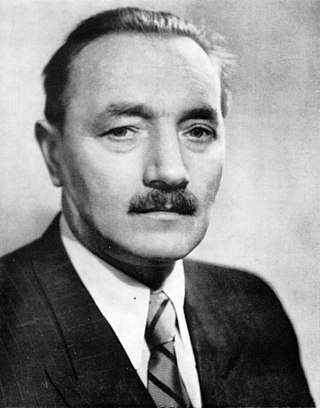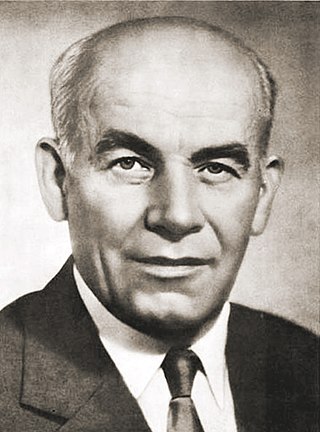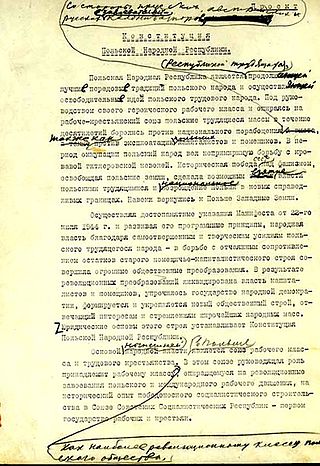| |||||
| Decades: | |||||
|---|---|---|---|---|---|
| See also: | |||||
Events during the year 1946 in Poland.
| |||||
| Decades: | |||||
|---|---|---|---|---|---|
| See also: | |||||
Events during the year 1946 in Poland.

Poland, officially the Republic of Poland, is a country in Central Europe. It extends from the Baltic Sea in the north to the Sudetes and Carpathian Mountains in the south, bordered by Lithuania and Russia to the northeast, Belarus and Ukraine to the east, Slovakia and the Czech Republic to the south, and Germany to the west. The territory is characterised by a varied landscape, diverse ecosystems, and temperate transitional climate. Poland is composed of sixteen voivodeships and is the fifth most populous member state of the European Union (EU), with over 38 million people, and the fifth largest EU country by land area, covering a combined area of 312,696 km2 (120,733 sq mi). The capital and largest city is Warsaw; other major cities include Kraków, Wrocław, Łódź, Poznań, and Gdańsk.

The president of the Council of Ministers, colloquially and commonly referred to as the prime minister, is the head of the cabinet and the head of government of Poland. The responsibilities and traditions of the office stem from the creation of the contemporary Polish state, and the office is defined in the Constitution of Poland. According to the Constitution, the president nominates and appoints the prime minister, who will then propose the composition of the Cabinet. Fourteen days following their appointment, the prime minister must submit a programme outlining the government's agenda to the Sejm, requiring a vote of confidence. Conflicts stemming from both interest and powers have arisen between the offices of President and Prime Minister in the past.

Bolesław Bierut was a Polish communist activist and politician, leader of communist-ruled Poland from 1947 until 1956. He was President of the State National Council from 1944 to 1947, President of Poland from 1947 to 1952, General Secretary of the Central Committee of the Polish United Workers' Party from 1948 to 1956, and Prime Minister of Poland from 1952 to 1954. Bierut was a self-educated person. He implemented aspects of the Stalinist system in Poland. Together with Władysław Gomułka, his main rival, Bierut is chiefly responsible for the historic changes that Poland underwent in the aftermath of World War II. Unlike any of his communist successors, Bierut led Poland until his death.

Kielce is a city in south-central Poland and the capital of the Świętokrzyskie Voivodeship. In 2021, it had 192,468 inhabitants. The city is in the middle of the Świętokrzyskie Mountains, on the banks of the Silnica River, in the northern part of the historical Polish province of Lesser Poland.

A pogrom is a violent riot incited with the aim of massacring or expelling an ethnic or religious group, particularly Jews. The term entered the English language from Russian to describe 19th- and 20th-century attacks on Jews in the Russian Empire. Retrospectively, similar attacks against Jews which occurred in other times and places also became known as pogroms. Sometimes the word is used to describe publicly sanctioned purgative attacks against non-Jewish groups. The characteristics of a pogrom vary widely, depending on the specific incident, at times leading to, or culminating in, massacres.

Władysław Gomułka was a Polish Communist politician. He was the de facto leader of post-war Poland from 1947 until 1948, and again from 1956 to 1970.

The Polish Beer-Lovers' Party was a satirical Polish political party that was founded in 1990. Originally, the party's goal was to promote cultural beer-drinking in English-style pubs instead of vodka and thus fight alcoholism, but it eventually developed a serious platform based around tax reform and green politics.

Hanna Stanisława Suchocka is a Polish political figure, lawyer, professor at Adam Mickiewicz University in Poznań and Chair of the Constitutional Law Department, former First Vice-President and Honorary President of the Venice Commission.

Janusz Adam Onyszkiewicz is a Polish mathematician, alpinist, politician who served as Minister of Defence twice, in the cabinets of Hanna Suchocka (1992–1993) and Jerzy Buzek (1997–2000).

The Kielce pogrom was an outbreak of violence toward the Jewish community centre's gathering of refugees in the city of Kielce, Poland, on 4 July 1946 by Polish soldiers, police officers, and civilians during which 42 Jews were killed and more than 40 were wounded. Polish courts later sentenced nine of the attackers to death in connection with the crimes.

Parliamentary elections were held in Poland on 19 January 1947, the first since World War II. According to the official results, the Democratic Bloc, dominated by the communist Polish Workers Party (PPR) and also including the Polish Socialist Party (PPS), People's Party (SL), Democratic Party (SD) and non-partisan candidates officially received 80% of the vote and 394 of the 444 seats in the Legislative Sejm. The largest opposition party, the Polish People's Party, was officially credited with 28 seats. However, the elections were characterized by violence; anti-communist opposition candidates and activists were persecuted by the Volunteer Reserve Militia (ORMO). The elections were heavily manipulated, and the opposition claimed that it would have won in a landslide had the election been conducted in a fair manner.

The Constitution of the Polish People's Republic was a supreme law passed in communist-ruled Poland on 22 July 1952. It superseded the post-World War II provisional Small Constitution of 1947, which in turn replaced the pre-war April Constitution of 1935.

Parliamentary elections were held in Poland on 26 October 1952. They were the first elections to the Sejm, the parliament of the Polish People's Republic. The official rules for the elections were outlined in the new Constitution of the Polish People's Republic and lesser acts.

The Polish October, also known as the Polish thaw or Gomułka's thaw, also "small stabilization" was a change in the politics of the Polish People's Republic that occurred in October 1956. Władysław Gomułka was appointed First Secretary of the ruling Polish United Workers' Party (PZPR) marking the end of Stalinism in Poland.
The Warsaw pogrom was a pogrom that took place in Russian-controlled Warsaw on 25–27 December 1881, then part of Congress Poland in the Russian Empire, resulting in two people dead and 24 injured.
Anti-Jewish violence in Poland from 1944 to 1946 preceded and followed the end of World War II in Europe and influenced the postwar history of the Jews and Polish-Jewish relations. It occurred amid a period of violence and anarchy across the country caused by lawlessness and anti-communist resistance against the Soviet-backed communist takeover of Poland. The estimated number of Jewish victims varies, ranging up to 2,000. In 2021, Julian Kwiek published the first scientific register of incidents and victims of anti-Jewish violence in Poland from 1944 to 1947; according to Kwiek's calculations, the number of victims was 1,074 to 1,121. Jews constituted between two and three percent of the total number of victims of postwar violence in the country, including Polish Jews who managed to escape the Holocaust in territories of Poland annexed by the Soviet Union, and returned after the border changes imposed by the Allies at the Yalta Conference. Incidents ranged from individual attacks to pogroms.

Relations between the People's Republic of China and Poland officially began on October 5, 1949.
Bierut Decrees German: Bierut-Dekrete is a term used in German historiography referring to a series of decrees, laws and regulations enacted by the Provisional Government of National Unity between 1945 and 1946 concerning the flight and expulsion of ethnic Germans from Poland and the property issues arising from them.
The following lists events that happened during 1949 in Poland.
Events during the year 1992 in Poland.